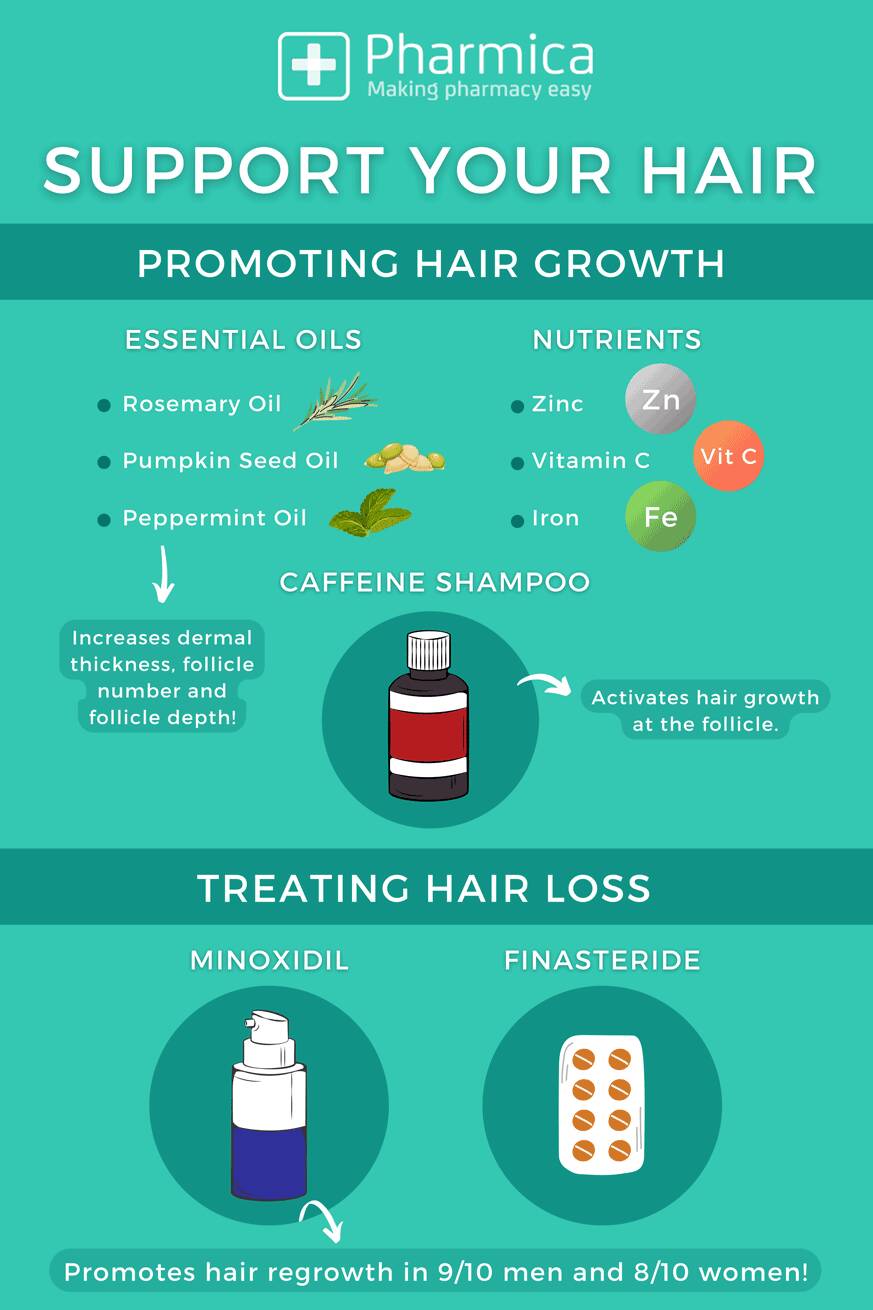
Did you know the average person loses between 50 and 100 hairs a day according to the NHS?[1]
Considering hair loss affects people of all ages, genders and backgrounds, it’s unsurprising to see a growth in public interest in scientifically proven ways to promote hair growth and treat hair loss in recent years.
In response, our pharmacy team has considered the results of multiple medical studies and analysed data from various credible sources such as the National Institute for Health and Care Excellence to bring you the most accurate information on encouraging hair growth.

What stimulates hair growth internally?
Vitamins and minerals
There is ample empirical evidence to suggest that certain vitamins and minerals can help with the healthy development of hair follicles and their surrounding oil glands.[2] Many of these vitamins and minerals can be found in abundance in certain foods, in addition to nutritional supplements.
Our pharmacy team recommends following the recommended dietary intake for the following vitamins and minerals to help promote hair growth in line with the latest advice from the NHS.[3]
Zinc
Some studies show that zinc can help to keep the oil glands around the hair follicle working correctly.[4] As hair loss is a known symptom of zinc deficiency, it is recommended to intake zinc for healthy hair tissue growth and repair.
Seafood, beef, poultry, legumes, and whole grains all contain naturally high concentrations of zinc.[5] If these foods cannot be eaten due to reasons such as religious beliefs or allergies, zinc supplements are an excellent alternative.
Iron
Research shows that iron deficiencies can inhibit the production of haemoglobin - a protein in red blood cells that carries oxygen to hair cells.[6] Therefore, eating enough iron as part of a balanced diet can help with increasing hair growth.
Oysters, eggs, and red meat are excellent sources of iron. If you’re looking for vegan options, consider eating leafy greens like spinach or whole grains or supplementing your diet with multivitamins with iron to meet your daily recommended intake of iron.
Vitamin C
According to research, adequate vitamin C intake can help to increase hair growth because it can make the body better at absorbing iron.[7] This is important because the more iron the body absorbs, the more likely it is for oxygen to reach hair cells and stimulate hair follicle growth.
Therefore, eating citrus fruits that contain high concentrations of vitamin C like oranges and pineapples can help improve hair growth.
Vitamin D
Some studies suggest that vitamin D receptors (VDRs) in the body can affect the anagen phase of hair growth (the phase when cells inside hair roots divide and grow in number faster than any other point in a normal hair growth cycle).[8] Studies also show that low levels of vitamin D can decrease the expression and activity of VDRs in the body.[9]
Therefore, getting enough vitamin D through methods such as spending time in the sun can help increase hair growth. If this is not possible due to factors such as the weather, vitamin D supplements are recommended.
Essential oils
Rosemary oil
A study from 2015 found that applying rosemary oil to the scalp over 6 months can increase head hair count among individuals with androgenetic alopecia (commonly known as male pattern baldness).[10] However, it is important to note that this claim has yet to be substantiated by a more recent study.
Pumpkin seed oil
Limited studies support the claim that pumpkin seed oil can stimulate new hair growth. For instance, one study linked the daily consumption of 400mg of pumpkin seed oil to an increase in hair count of up to 40% within a 24-week period.[11] However, this study was limited to a sample size of 76 men in Korea - so its findings may not be universally applicable.
Peppermint oil
One study found that peppermint oil can help increase dermal thickness and the number and depth of hair follicles among individuals who apply it to their hair.[12] According to the study, the menthol inside peppermint oil acts as a vasodilator that can improve blood circulation to the scalp and potentially induce the anagen stage of hair growth.
Finasteride tablets
Finasteride tablets are clinically proven to improve hair growth by preventing an enzyme called ‘5-alpha reductase’ from converting testosterone to DHT inside the body (DHT is a hormone that is known to cause hair thinning). Finasteride is a male-only treatment.
Research shows that finasteride can stimulate hair follicles in 90% of men with male pattern baldness and can promote hair regrowth in 66% of men who take it regularly.[13]
Encouraging hair growth externally
Caffeine shampoos
There is empirical evidence to suggest that using hair products such as caffeine shampoos or caffeine liquids for a minimum of 24 weeks can promote hair follicle growth and result in improved hair density.[14][15]
Experts believe this occurs because caffeine prevents a type of testosterone called DHT from shrinking hair follicles and shortening hair growth cycles.[16]
Minoxidil foam or solution
Studies show that applying minoxidil foam or minoxidil solution to hair roots can cause a scalp enzyme called sulphotransferase to convert the minoxidil in the product into minoxidil sulphate.[17] Minoxidil sulphate can shorten the telogen (resting) phase of the hair, causing the anagen (growth) stage to arrive sooner and encouraging hair growth as a result.
Minoxidil is approved for the treatment of hair loss by the Medicines and Healthcare Products Regulatory Agency, and its application can encourage hair regrowth in both men and women.
Factors that can slow down hair growth
Heat treatments
According to a recent study[18], heat stress caused by the use of heat treatments on hair such as hair straighteners can prevent the production of GAS6 - a molecule that activates hair follicle stem cells to help regenerate hair. Heat treatments can also damage the hair shaft and cause breakage, reducing the length and thickness of hair.
High-fat diets
Some studies suggest that in comparison to a balanced diet, a high-fat diet can cause cells that specialise in hair regeneration to switch over to repairing skin.[19] Therefore, it is recommended to avoid excessively consuming fat as a potential way to encourage hair growth.
Chronic stress
Researchers have found that chronic stress can affect the immune system and cause increased levels of systemic inflammation in the body.[20] This in turn can impact the transition between the anagen (growth) and telogen (shedding) stages of the hair growth cycle, making it more likely for hairs to be pushed into the resting phase and fall out.
This implies that managing chronic stress through methods such as meditation and breathing exercises can be used to promote hair growth.
Stimulate hair growth using scientifically proven treatments
At Pharmica, we offer several MHRA-approved hair treatments that are clinically proven to help encourage hair growth. We deliver all treatments conveniently and discreetly to protect privacy and offer online consultations for hair loss treatments to ensure patient safety.
We’ve proudly helped over a million people with their health and are ranked 4.9 out of 5 from more than 160,000 reviews, making us one of the UK’s best online pharmacies.
Browse our full range of treatments today.